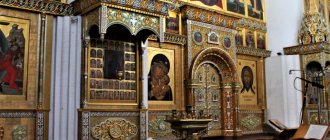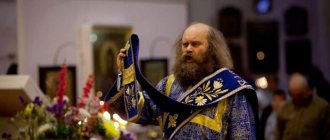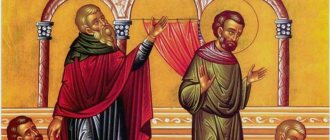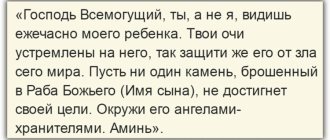The Patriarch's confessor, Schema-Archimandrite Eli (Nozdrin), often practices deep prayer as a “personal conversation with the Lord,” asking during it for the granting of help to our people and the Fatherland.
Usually his prayer request results in our country overcoming the difficulties it faces, no matter how difficult they may be. For believers, pure prayer can help in especially difficult situations when no other prayer can do this.
Therefore, if you have a problem and you don’t know what to do, you should pray in this way.
Pure prayer is part of the litany, but not a variation of it
The special litany is not recognized as a prayer service, but may be included in its sequence. In some parishes there is a tradition of inserting petitions for the sick, for those traveling, etc., as part of the special litany.
Eketinia is included, as one of the main components of the divine service, in most of the divine services in the Orthodox Church. A special eketinia or a special prayer is served along with such types of eketinia as:
- Great (peaceful).
- Small.
- Supplementary.
- Funeral.
- About the catechumens, and thanksgiving (after Communion) at the Liturgy.
- Foundry.
- Final (at the end of Compline and Midnight Office).
- Litany at various prayer services, sacraments, religious services, monastic tonsures, consecrations, and some other types.
The deacon, reading the litany, holds it in his outstretched right hand after each petition and makes the sign of the blessing upon himself.
Andrey Ryabushkin, 1888. In the Russian Church, Eketinia is traditionally read by a deacon. Eketinia is read only in church. This is usually done by a deacon, although sometimes a priest can also read such a prayer in cases where the church does not have a full-time deacon.
The reading of the Eketinia was historically present in the Greek Church, and only in the Russian Church was there a deacon specially kept for such a service.
Only in the Russian Church was there a deacon specially kept for the reading of the Eketinia.
Nowadays, the Eketinia is most often read by priests, since not all churches have deacons.
This changes absolutely nothing. The fact is that only the Lord gives help through prayer. It is in him that one must rely; this is the only way to be saved.
What is the difference from a litany?
A special litany is a large general prayer. It is correct to call the litany not a prayer, but a section of the liturgy, which consists of petitions to the Lord from the parishioners of the temple.
Literally, “litany” is translated from Greek as “long prayer.” But it is not prayer, but an integral element of the content of the service, its integral part, section.
The litany consists of prayers and, depending on their types, as well as the general nature of the service, can take various forms. Prayer is devoid of this; it is subordinated to one thought and goal.
Eketinia is read on the pulpit, facing the altar
A deacon or priest reads the Eketinia, standing on the pulpit facing the altar. Such a prayer appeal is always read in dialogue with the choir. The response words of the choir are called acclamations. Typically, there are four different acclamations in Eketinia:
- "Lord have mercy".
- “Give it, Lord.”
- "To you, Lord."
- “Amen” is the final one.
Video: Pure eketenia. Metochion of the Moscow Patriarchate gr. Sofia. In the first second, you can see how the priest serves, turning his face to the throne.
The litany begins with a call to prayer, followed by various petitions and ends with an exclamation glorifying God (pronounced by the priest). After each petition, depending on its content, the choir sings “Lord, have mercy,” “give, Lord,” or “To you, Lord.”
The litany ends with the exclamation of the priest, to which the choir responds: “Amen.” The exclamation of the priest in most cases is a loudly voiced ending to a prayer read in a low voice (secretly) during the litany.
A special prayer is one of the types of private prayer services.
In the Orthodox Church, a strict eketinia is understood as an enhanced prayer sequence of petitions. The word “sugubiti” itself means “strengthen”, “double”. It involves intense prayer.
It contains mainly petitions about persons: the Patriarch, the ruling bishop, the country (rulers and troops), about deceased Christians (primarily the creators of the temple), as well as about all those who perform divine services in it and perform various obediences, as well as upcoming ones.
On October 4, 2018, a prayer service was held in front of a particle of the relics of St. Spyridon of Trimythous in the Cathedral Church of Christ the Savior. Unlike Eketinia, the prayer service is short
As for pure prayer, a prayer service is one of the types of private worship. It is short and has a pleading or grateful nature. Those praying ask the Lord, the Mother of God or a saint to send mercy or thank them for receiving benefits.
Eketinia is a long prayer appeal to God and can be read for several hours.
Prayer services are divided into general and private. For the first, they are typically performed on temple holidays, on the New Year, before the start of the school year, during natural disasters, epidemics, etc.
As for private prayers, they are performed at the request of individuals, for example, for the consecration and blessing of food, for the bestowal of spiritual and physical health.
In prayer, the Lord is asked for help in particularly difficult cases.
Usually, deep prayer occurs at the Divine Liturgy, since this form of prayer is the most effective. At the same time, the deacon or priest prays for the health and repose of those for whom this demand is pronounced. Usually they specifically or purely ask the Lord for a solution to a specific problem.
Typically, special prayer services are ordered for:
- admonition and instruction on the righteous path;
- spiritual and physical health;
- assistance in arranging marriage;
- the gift of a child;
- assistance in learning;
- solving the housing problem;
- assistance in performing military duties;
- protection from demonic attacks;
- forgiveness of the sin of infanticide;
- about recovery from alcoholism, drug addiction, gambling and smoking.
Archpriest Alexander Ilyashenko.
Father Alexander, in his sermons, examines in detail the topic of deep prayer and ecetinia. Miracle-working prayer Official website
Archpriest Alexander Ilyashenko on the miraculous prayer website says that a special prayer service is held at the liturgy. Sometimes one service is enough, but usually the duration of such prayer is determined by the degree of complexity of the problems that require solutions.
Usually, for positive changes, it is recommended to perform intense prayers during 12-40 liturgies. But sometimes (in difficult spiritual situations) intense prayers are performed for six months or even a year.
The one who ordered a special prayer must himself join in the prayer act
In any case, the spiritual rules of a Christian’s life should be constant work on oneself. That is why the one who ordered a special prayer is obliged to join the prayer act. The fact is that without working spiritually, it is impossible to be saved. Neglecting the rules of spiritual life can lead to spiritual death.
Consecration of the apartment. The consecration of an apartment or house is one of those actions that must be performed as an accompaniment to a special prayer
That is why ordered special prayers must be accompanied by the following actions:
- It is necessary to reevaluate your life and start living according to the commandments.
- Bless the house (apartment) in which you live.
- Pray for the departed. By begging before the beginning of the special prayer of the deceased, we provide assistance to their living relatives.
- Forgive each other, comprehend your entire life, actions and words in order to come to deep repentance.
- Give alms, do good to the people around you.
Often the cause of the problems of the living is the unforgivable sins of deceased relatives up to 3rd or 4th generation.
Very often, the cause of the sins and problems of the living are the unresolved sins of deceased relatives up to the 3rd or 4th generation. Therefore, it is advisable to simultaneously order the magpie and the Psalter about them for 40 days. In addition, it is also worth ordering memorial services for the deceased. Such prayerful work provides significant assistance when reading a special prayer.
Does anything need to be done?
The Lord Himself does not need any actions from man; God only needs faith. But the person himself often needs to do something, undertake something in his daily life.
It is easier for people to mentally join the ordered prayer act if they do:
- consecration of your home;
- comprehend the commandments and their daily actions;
- they remember the dead in church;
- ask for the health of loved ones in the temple;
- attend services;
- repent of sins - both involuntary and intentional.
Deliberate sin is the scourge of the soul of modern man. The point is that, knowing that an action is bad and goes against God’s commandments, a person commits it anyway. And then, as people say, “the cats are scratching at his soul.”
Often it is precisely such actions that lead to the need for custom prayer, specific or otherwise.
How to correctly order a special prayer for health
In deep prayer we can remember both the living and the dead, since by remembering the dead we help the living. As for the most common prayers, the prayer for health is most often ordered.
At the same time, it is necessary to remember that during prayer one should not only make requests, but also thank God. The fact is that at the same time as the ordered one, you should also do your own prayer at home.
Church notes. All requests for special prayer must be submitted prior to the start of the service.
Notes for a special prayer for health are submitted before the start of the service. Notes can only be submitted about those who are alive. According to church regulations, first the names of saints and church leaders are written, then parents are mentioned, then one’s name is written, children, spouses, relatives - all in the genitive case.
They are later read by the deacon. Prayers for the health of these people are said by the priest standing in front of the throne. In addition, magpie is also ordered about health.
The ordering of special prayers, said by a deacon or priest, in accordance with the church charter, is carried out only for those believers who constantly go to church and participate in the sacraments (confess and receive communion).
In other cases, it is better to order a prayer service for health. It will be served regardless of the liturgy, in a church or at home, in contrast to a special prayer or eketinia.
What kind of prayer is this?
Many have heard that there is a special prayer for health. Not everyone understands what it is, when and why it is needed. Meanwhile, deep prayer is a traditional type of component of the liturgy. It is pronounced at the personal request of the believer and can concern not only health, but also other life aspects or problems.
Prayer is ordered from clergy in any church, monastery or other parish. It will be read by the serving priest within the part of the liturgy specially designated for the needs of the parishioners.
The text of the moleben (pure prayer) is different
Despite the fact that a special prayer can be ordered in an Orthodox church or monastery, the prayer test can be said in your own words. Usually the person praying or the priest asks the Mother of God and the saints for help, although you can turn directly to the Lord.
Moreover, during the litany, the prayer usually begins with the words: “Let us pray to the Lord.”
Doctrine of Orthodox worship. Archpriest Vasily Mikhailovsky. 1906 Tests of pure prayer can be found in special church literature
Text of the special prayer:
“Lord Almighty, have mercy on me, your servant (proper name). Send me wisdom and humility, teach me what to do, do not leave your great one without help. Lord judge me with (listing or brief description of a life situation, the essence of the request). Show me the right path, enlighten me and instruct me. Grant, Lord, health and patience.
Help the sick and strengthen the healthy. Give bread to the hungry and fill the well-fed with compassion. Do not leave your children in difficult times and me, your servant (proper name), among others.
There is nothing greater than my faith, nothing greater than my humility, but there is much grief and suffering in the world. In the midst of great concerns for the suffering, strengthen my spirit and grant me to wait for the glorious moment, the sight of help, amen.”
Where can I order such a prayer?
The place does not matter, so that in a difficult life situation, prayer can help. Whether it be a monastery or a temple next to the house is not so important. The main thing is faith and conviction in your actions, as well as sincerity in your intentions. If a person orders prayer services, but at the same time continues to lead a sinful life, then such duplicity will not lead to anything good.
However, given that in our country most of the monasteries and temples were closed and, in principle, desecrated, the question of location matters. Before ordering a prayer service, you need to go to the temple and stay in it for some time, stand and listen to yourself. If this church is not particularly cozy mentally, you want to leave it, or even irritation sets in, then there is no need to order prayers in this church, regardless of which clergy work in it.
The temple, which has preserved the centuries-old energy, is felt immediately and unmistakably. In such a church, peace and tranquility comes to the soul, and when leaving the church, a person seems to glow from within. He smiles and is open to everything good and bright. It is in such a temple that you need to order prayer services.
Church services are ordered only in an Orthodox church or monastery
It is necessary to remember that church services are ordered only in an Orthodox church or monastery. The fact is that only a priest can perform them. Only he can perform a sacrament, for example, the blessing of water. A believer who does not have a priestly title can pray on his own at home.
Pure prayer is usually performed during 7-12 liturgies.
In addition, it is worth going to a temple or monastery because prayer is offered there constantly. Thus, in some monasteries, services are conducted around the clock. As a result, intense prayer will be performed for 7-12 liturgies and even 40 days. Naturally, this cannot be repeated at home.
The priest reads "Sorokoust". A special prayer can be read either for one liturgy or forty
It should be noted that many clergy say that part of the flock’s attitude towards custom prayers is incorrect. For Orthodox Christians, a situation where prayer is ordered as a commodity is unacceptable.
A temple or monastery is not a store. The prayer that the person who ordered it asks for will not bring any benefit when he does not work on himself spiritually. It is necessary to pray, repent and receive communion, then the Lord will more quickly answer the prayer request expressed in a special prayer request.
What do clergymen advise?
Many clergy are puzzled by the attitude of their flock to custom prayer services. What worries priests is that, having ordered the reading of a prayer, many people consider their participation completed. That is, they do not consider it necessary to work on their own soul, to pray on their own, or even to do anything to correct the life situation for which the prayer was ordered.
This is a general trend that clergy everywhere are worried about. People lose spirituality and come to churches as if they were going to shops. This attitude is not only wrong, but also harmful. A prayer that the person who ordered it does not care about and does not trust in will not bring any benefit.
The fee for ordered prayers is a donation, not the price of the service
Usually in monasteries or temples it is customary to make a donation for reading. Usually the size of such a donation is as follows: a commemoration at the proskomedia for health and repose (with a piece taken out):
- for 40 days - 100 rubles;
- for 6 months - 150 rubles;
- for 12 months - 300 rubles;
- for 40 days—100 rubles;
- for 6 months - 150 rubles;
- for 12 months - 300 rubles.
All monks and priests live on donations from believers.
This situation often becomes the subject of criticism from non-believers and newly converted members of the Church. In this case, it is necessary to always remember that the Orthodox Church has both an invisible, spiritual side and a visible, physical side.
From the spiritual side, a donation, a donation, and not a payment for a service, is alms. All monks and almost all priests live on such alms.
Preaching of Christ. Rembrandt Harmes van Rijn. The Lord called for giving alms. A sacrifice to the temple is the same alms in the spiritual sense. In practical terms - a believer’s contribution to the maintenance of the temple and clergy
Speaking about this spiritual side, the Lord said:
(Luke 12:33-34)
“Sell your possessions and give alms. Prepare for yourselves sheaths that do not wear out, an unfailing treasure in heaven, where no thief approaches and no moth destroys, for where your treasure is, there will your heart be also.”
Thus, by donating in a temple or monastery, a person commits a good deed.
As for the practical side of the matter, members of the church community are obliged to improve their church and provide for the urgent needs of its clergy, so that divine services do not stop there.
Many people forget about this. For such maintenance you need candles, you need to pay for electricity, purchase church wine for the Sacrament of the Eucharist, etc. If the parish is rich and donates large sums for these needs, the size of the donation after church services will be minimal.
By leaving a comment, you accept the user agreement











